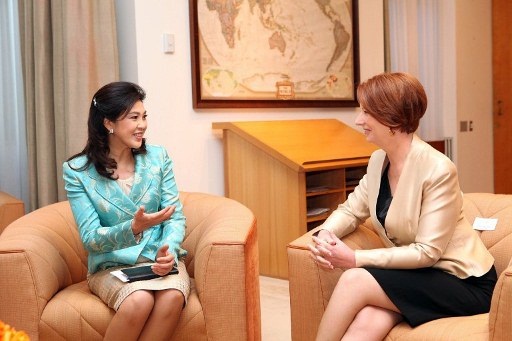Source: http://www.mcot.net/cfcustom/cache_page/englishnews.html
Yesterday, Australia’s Prime Minister, Julia Gillard, provided a warm and welcoming luncheon for Yingluck Shinawatra in the Great Hall of Parliament House. A crowd of several hundred–politicians, diplomats, soldiers, business men and women, academics, students and members of the Australian Thai community–dined on coriander crusted beef tenderloin (with caramelised carrot spears), herb and pistachio crusted salmon (with truffle infused prawns) and plates of petits fours (chocolate dipped mango strips were the highlight!).
Prime Ministers Gillard and Yingluck entered the Great Hall after an evocative indigenous performance by the Wiradjuri Echoes. Seeing the first female Prime Ministers of both Australia and Thailand standing side-by-side on the stage was, for me, a spine tingling moment. As the respective anthems were played, it was impossible not to reflect on their very different political fortunes: one politically ascendant; the other struggling to maintain a tenuous hold on power. Contrary to all the popular stereotypes of Thai politics, and the tumult of recent years, Yingluck’s beaming smile held out the hope of democratic stability, built on a foundation of electoral domination and adroit manoeuvring. Gillard is no less pragmatic in her power play but, despite occasional spasms in the opinion polls , her impressive personal presence is overshadowed by profound electoral weakness and internal party turmoil. Strangely, Thai politics looks rather more stable than the tumult in Canberra.
After toasts to His Majesty the King and Her Majesty the Queen (Elizabeth, not Sirikit), the speeches were warm, but restrained, affairs speaking of the 60-year history of Australia-Thailand cooperation. Tony Abbott, the leader of Australia’s Opposition, was the most interesting as he mentioned, in passing, the two biggest elephants in the room. His was the only utterance of the “T-word” when he noted that it was Thaksin himself who had signed the Australia-Thailand Free Trade Agreement in 2004. Yingluck’s political future is, of course, bound with that of Thaksin and one can only hope that Australian officials felt sufficiently emboldened to sound her out on plans for Thaksin’s return to Thailand. Abbott also unintentionally summoned up the great uncertainty in Thailand’s political future when he noted that Australia had contributed to the education of the Crown Prince both at the Kings School (in Sydney) and at Duntroon. Education relations between Thailand and Australia are strong, but this may not have been the best illustration.
An interesting footnote was the brief visit of senior opposition figure Andrew Robb to the Prime Ministerial table where he paid his respects to Yingluck. Robb, a famed Liberal Party strategist, provided influential advice to Thaksin in the lead-up to the 2001 election in which he first won power. As Robb writes in his autobiography:
I helped Thaksin plan the creation of the political party called Thai Rak Thai … and then ran a series of campaigning seminars with senior members of the political team that he had already assembled. It was fascinating to immerse myself in the politics of an Asian country … and to have input into developing a philosophical base for this nationwide party.
That’s the sort of advice the besieged Gillard needs right now!
 Facebook
Facebook  Twitter
Twitter  Soundcloud
Soundcloud  Youtube
Youtube  Rss
Rss 